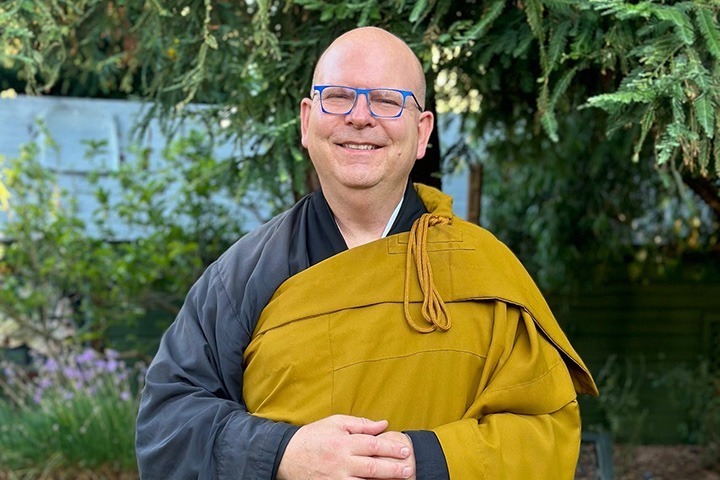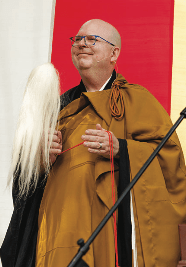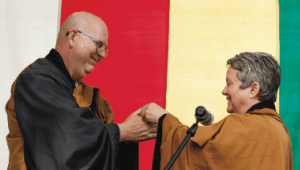
Ascending the Mountain – Some Ponderings
July 1, 2023

by Tom Dharma-Joy Reichert
When I was first asked to write this article on ascending the mountain, I happily accepted. But it is now over
a month late because – how do I talk about ascending the mountain? Having just received the Temple Seal several weeks ago, what do I really have to say? Much to the consternation of the Water Wheel staff, I have really pondered and pondered.
Here are a few thoughts.
1. Being Grateful. Always begin with gratitude. As practice develops, hopefully our gratitude and appreciation for others deepens. We realize the fact of interconnection, and that we are all, always, standing on the shoulders of all those who have come before us and who stand alongside us, no matter where we are, no matter what we are doing. Ascending the mountain is very much the same. I am very grateful to my predecessor, Sensei Faith-Mind Thoresen. She has been an inspiration to me. For many years while she was working as a flight attendant, she would arrange her schedule so that she could attend every sesshin at ZCLA. Eventually, after she retired, she took on more and more responsibility at the Zen Center. When Roshi Egyoku asked her to become abbot, she said yes – not because she hankered for the position – far from it! – but because her teacher asked her to and because it was a way she could be of service to her teacher and to the Sangha.
It was the same with Roshi Egyoku – when Roshi Bernie asked her to come back to ZCLA, it was not exactly an appealing request. Zen Center was in total chaos, its founding abbot had died just 2 years earlier and things were falling apart. Nevertheless, when Roshi Bernie asked her, she said yes, to support her teacher and out of love for this practice place. I am grateful to both of them for saying “yes” when asked, and for building the strong training temple that we have become.
As I was preparing to step into this position, I spent a lot of time with Sensei Faith-Mind, learning various aspects of this position. I began to understand that much of the function of the Abbot Seat is largely invisible to most of the Sangha; it involves a lot of the quotidian tasks that keep the Zen Center functioning on a daily basis, as well as handling various sensitive interpersonal issues and addressing conflicts that crop up in any place with more than one human being. Much of what the abbot does is thankless – and necessary.
It is notable that she handled this position through a pandemic. Sensei Faith-Mind ascended the mountain in June 2019, and ZCLA closed to the outside world nine months later, with great uncertainty about the future, our finances, and how we would continue to offer the Dharma and training in a world where isolation was suddenly not only the norm but imposed and enforced! And, of course, shortly thereafter, Sensei Faith-Mind was diagnosed with cancer and had to endure a grueling regimen of treatment. With the Board and Roshi Egyoku supporting her, she carried forward with great skill and brought both herself and all of us through to the other side. So I am deeply grateful to Sensei Faith-Mind, who took on this role and steadfastly attended to it through very difficult circumstances.
“standing on the shoulders of all those who have come before…”
I am equally grateful to Roshi Egyoku, our third abbot, who served in that role for 20 years. I have learned a tremendous amount from her over the years – not because she was formally “training” me, but because I was observing her. Zen training is an apprentice system, which is why a monastic setting is so ideally suited, as people work side by side for many years. Roshi Egyoku was Maezumi Roshi’s jisha for many years, and learned a tremendous amount from this proximity; many of his successors had the same experience over time. In current times, we are not a monastery, which doesn’t mean we don’t have an apprentice system, it just means it takes a lot longer. (Fortunately, I was relatively young when I first arrived!) We learn by observing, and then doing. After hanging around a bit we soak it into our bones. Then we are assigned a position, we learn the basics of what needs to “get done,” we learn these mechanical elements and, once we have them down, we relax into the position, make it our own, and invest it with heart. Then, we can dance! Whether the position is being jikido for sesshin, or being doan, or officiating at service – or being abbot – the process is the same. But it requires being present (both in body and mind) as the first step!

Sensei Faith-Mind offers the Temple Seal to Sensei Dharma-Joy. ( Photo by Myokan Schwartz-Hughes.)
2. Serving. Each of us who has taken on the Bodhisattva vows is engaged in a life of service, and each position that we take on provides a different avenue through which to serve. In the Zendo, the jikido is essential in serving the community by enabling us to sit with ease, knowing that someone will watch the clock and take care of the Zendo, and will tell us when to start and when to get up. The guest steward is essential in taking care of our guests, the tenzo in feeding people, and so on. Everything we do at Zen Center is infused with service, and every activity is part of our practice of collective awakening. This is an essential point that we have to come back to again and again. We are not a business, and efficiency is not a goal or even a particularly important yardstick of accomplishment. How we serve each other, how we take care of each other, how we practice together – and make a place conducive for the practice of others – these are the important values in the function of a Zen Center. This is heretical from a “business” perspective – our society thinks in transactional terms, zero-sum games, of gaining and losing, meeting and exceeding, but this acquisitive mindset is wholly antithetical to the core training of our school.
Recently, I had the chance to visit our sister temple, Yokoji Zen Mountain Center, and talk with its Abbot, Roshi Charles Tenshin Fletcher. I was talking with him about taking on this role and was seeking input and advice from him. He was the head administrator at ZCLA for many years, and has been abbot of Yokoji for decades, so I wanted his input. His response was very simple: “Serve the people.” It was wonderful to hear him say this. What “serving the people” will look like is still to be written, but his comment confirmed my own orientation towards the function of the Abbot Seat.
“Each of us…is engaged in a life of service.”
3. Unfolding. A few days ago, when contemplating what to write, the image that popped into my mind was of one of the Mars landers, or the James Webb telescope. I’m a big fan of space exploration – the first specific memory I have is from when my parents allowed me to stay up late in order to watch the Apollo 13 moon landing and Neil Armstrong’s lunar walk – so I shouldn’t be surprised this is where my mind went in looking for analogies.
With the Mars landers as with the deployment of the James Webb Space Telescope, the actualization of its function happens very slowly and deliberately. With the lander, I recall that after it landed, it took something like a week before a single panel was opened up. Then, it was thoroughly tested. Time passed. Then, another panel was opened up. It was tested. Time passed. Eventually, it moved – maybe 3 feet. Well, you get the idea. So far, this “ascending the mountain” has been a lot like that for me. Since “landing” (or maybe “ascending,” depending on which metaphor you want to adopt), each day has involved a small additional extension of my perspective over the day before. Each day, the concentric circles expand. The panel opens, it is tested, time passes, then it opens a little bit wider. Each day, my perspective expands.
A key component of this slow expansion has been practicing with the Three Tenets of Not-Knowing, Bearing Witness, and taking action that naturally arises from this place of not knowing and bearing witness. Having been at Zen Center in some capacity for 23 years, there is a lot of “baggage” that needs to be shed when stepping into this position. The Abbot’s Seat is fundamentally different than the other roles I have held at Zen Center. I’ve been here for over 23 years, and for something like 22 of them I have held various positions of “responsibility.” But the abbot seat sits in the center of our mandala, in the Buddha Sphere. The function of the Abbot is to have the largest possible view. In this way, its charge is different. The other spheres – Resources, Relationships, Service and Study – are each connected to a particular view or function. The Buddha Sphere sits in the center. Its slogan is “Include everything!” It embodies the Wisdom of All-Inclusiveness. Taking the Abbot Seat requires me to shift my perspective, to widen my view, to let go of any sense of thematic agenda and to think bigger, to see bigger. If there are guiding question, they might be: “What am I not including? What am I leaving out? What is not being said?” Only by practicing moment after moment with the Three Tenets can I develop enough openness and clarity to be able to take this widest possible view, to be able to investigate what is not being said, and to invite all of you to this same investigation.
Let’s keep going!
Sensei Dharma-Joy is the 5th Abott of ZCLA.
